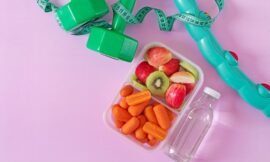This guide from trainer Aaron O’Connell will help you set your calorie intake and give you 9 tips for a more satisfying meal plan.
and decided to lose weight. You went on some diet that restricted your food intake, limited your food choices, and made you miserable. Then, to add to that, you spent endless hours at the gym for weeks on end, and then it turned out that you had only lost one pound. You got frustrated and gave up, only getting worse than when you started.
So there you have it, the “no-diet” that will help you reach your goals and really change your eating habits for long-term results. Let’s first determine an approximate amount of your calorie needs by doing the following equation(s).
Equation for estimating your resting metabolic rate (Harris-Benedict equation):
Men:
88.32 + (4,799 x H)+(13,397 x W) – (5,677 x A)
Women:
447.53 + (3.098 x H) + (9.247 x W) – (4.33 x A)
H = height in cm
W = Weight in kg
A = Age in years
Then multiply by the number corresponding to your activity level.
For weight gain or loss, add or subtract 400-500 calories from your total. Losing or gaining weight too quickly can lead to excess fat or lower metabolic rate due to loss of lean tissue.
- gram of carbohydrates = 4 kcal
- 1 gram of protein = 4 kcal
- 1 gram of fat = 9 kcal
- 1 gram of alcohol = 7 kcal
- 1 gram of fiber (insoluble) = -4 kcal.
Everyone has a different goal and desired outcome, select the ratios so that they best suit you and your goals. Remember that everyone is different, and the same combination/ratio of protein, carbohydrate and fat intake will lead to different results for each person. Find the combination(s) that work best for you.
Read also:
How to maximize your diet and achieve your weight loss goals
9 Dietary Plan Recommendations:
#1 – Drink Water. First of all, drink as:
much water as possible. I know you’ve all heard the recommendation to drink 8 glasses a day, which is a start, but it’s not enough to achieve your weight loss and/or muscle building goals.
There is no specific amount that is optimal, but usually more is better. Also, drink water as cold as possible: every ounce of iced cold water you consume burns one calorie.
#2 – Watch out for saturated fats. Make sure:
saturated fats are less than 10% of your total energy intake (kcal).
#3 – Eat enough fats. Consistent intake of less:
than 20% of total energy in the form of fats can lead to undesirable consequences by lowering high-density lipoprotein (HDL) cholesterol levels. In men, consistently inadequate fat intake leads to lower testosterone levels.
#4 – Carbohydrates: Don’t go too low:
Carbohydrates are the primary fuel for energy and are essential for maintaining/maximizing muscle growth and strength. A very low carb diet will provide excellent fat loss, but will also lead to muscle loss. (My experience with a low-carb diet: I was losing fat very fast, but my workout intensity decreased, my muscle filling/pumping disappeared, my strength decreased, and more. All of this led to a low metabolic rate, fewer calories burned per workout, and sluggishness throughout the day).
#5 – Macronutrient Balance. Maintain a good:
macronutrient balance. Reduce calorie intake equally for each nutrient to reduce calorie intake. Consistently consuming less of just one nutrient always leads to deficiencies and poorer results.
#6 – Frequent meals. Although not necessary:
eat smaller meals and more frequently. This will increase your metabolic rate slightly.
#7 – Timing your carbohydrate intake. To:
reduce fat as much as possible, consume most carbohydrates in the morning and afternoon. Your body will be better able to use the carbs consumed during the day to perform daily functions rather than during sleep.
#8 – Vary your food choices. Mix up your:
nutrient intake from different sources. (For example: carbs – beans, vegetables, fruits, grains, etc.) Protein – pork, beef, chicken, fish, dairy, etc.)
#9 – Consume foods that are high in:
nutrients. Even if you can “eat whatever you want,” consume foods that are high in nutrients (for example:
eating two slices of wheat toast with one cup of fresh strawberries will give you 26 g of carbs, 1.5 g of fat, 7 g of protein, 7 g of fiber (118 kcal), which will do you more good than a Nutrition-Grain bar containing 27 g of carbs, 3 g of fat, 2 g of protein, 1 g of fiber (139 kcal)
Eating predominantly nutritious foods will provide you with many benefits, not to mention the fact that you can eat more food!







